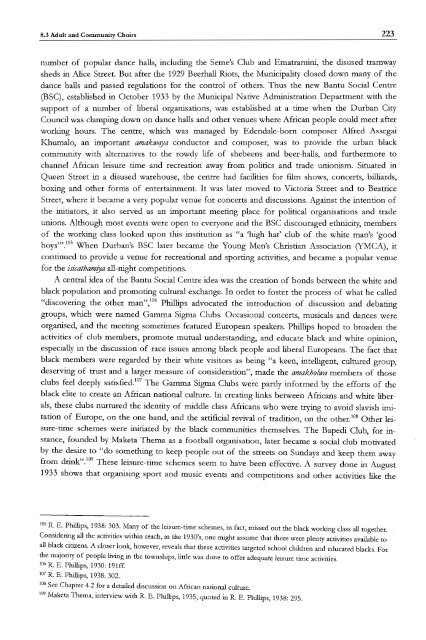South African Choral Music (Amakwaya): Song, Contest and the ...
South African Choral Music (Amakwaya): Song, Contest and the ...
South African Choral Music (Amakwaya): Song, Contest and the ...
Create successful ePaper yourself
Turn your PDF publications into a flip-book with our unique Google optimized e-Paper software.
8.3 Adult <strong>and</strong> Cormnunity Choirs 223<br />
number of popular dance halls, including <strong>the</strong> Seme's Club <strong>and</strong> Ematramini, <strong>the</strong> disused tramway<br />
sheds in Alice Street. But after <strong>the</strong> 1929 Beerhall Riots, <strong>the</strong> Municipality closed down many of <strong>the</strong><br />
dance halls <strong>and</strong> passed regulations for <strong>the</strong> control of o<strong>the</strong>rs. Thus <strong>the</strong> new Bantu Social Centre<br />
(BSC), established in October 1933 by <strong>the</strong> Municipal Native Administration Department with <strong>the</strong><br />
support of a number of liberal organisations, was established at a time when <strong>the</strong> Durban City<br />
Council was clamping down on dance halls <strong>and</strong> o<strong>the</strong>r venues where <strong>African</strong> people could meet after<br />
working hours. The centre, which was managed by Edendale-born composer Alfred Assegai<br />
Khumalo, an important amakwqya conductor <strong>and</strong> composer, was to provide <strong>the</strong> urban black<br />
community with alternatives to <strong>the</strong> rowdy life of shebeens <strong>and</strong> beer-halls, <strong>and</strong> fur<strong>the</strong>rmore to<br />
channel <strong>African</strong> leisure time <strong>and</strong> recreation away from politics <strong>and</strong> trade unionism. Situated in<br />
Queen Street in a disused warehouse, <strong>the</strong> centre had facilities for film shows, concerts, billiards,<br />
boxing <strong>and</strong> o<strong>the</strong>r forms of entertainment. It was later moved to Victoria Street <strong>and</strong> to Beatrice<br />
Street, where it became a very popular venue for concerts <strong>and</strong> discussions. Against <strong>the</strong> intention of<br />
<strong>the</strong> initiators, it also served as an important meeting place for political organisations <strong>and</strong> trade<br />
unions. Although most events were open to everyone <strong>and</strong> <strong>the</strong> BSC discouraged ethnicity, members<br />
of <strong>the</strong> working class looked upon this institution as "a 'high hat' club of <strong>the</strong> white man's 'good<br />
boys"'.105 When Durban's BSC later became <strong>the</strong> Young Men's Christian Association (YMCA), it<br />
continued to provide a venue for recreational <strong>and</strong> sporting activities, <strong>and</strong> became a popular venue<br />
for <strong>the</strong> isicathamrya all-night competitions.<br />
A central idea of <strong>the</strong> Bantu Social Centre idea was <strong>the</strong> creation of bonds between <strong>the</strong> white <strong>and</strong><br />
black population <strong>and</strong> promoting cultural exchange. In order to foster <strong>the</strong> process of what he called<br />
"discovering <strong>the</strong> o<strong>the</strong>r man,,/06 Phillips advocated <strong>the</strong> introduction of discussion <strong>and</strong> debating<br />
groups, which were named Gamma Sigma Clubs. Occasional concerts, musicals <strong>and</strong> dances were<br />
organised, <strong>and</strong> <strong>the</strong> meeting sometimes featured European speakers. Phillips hoped to broaden <strong>the</strong><br />
activities of club members, promote mutual underst<strong>and</strong>ing, <strong>and</strong> educate black <strong>and</strong> white opinion,<br />
especially in <strong>the</strong> discussion of race issues among black people <strong>and</strong> liberal Europeans. The fact that<br />
black members were regarded by <strong>the</strong>ir white visitors as being "a keen, intelligent, cultured group,<br />
deserving of trust <strong>and</strong> a larger measure of consideration", made <strong>the</strong> amakhofwa members of those<br />
clubs feel deeply satisfied. 107 The Gamma Sigma Clubs were pardy informed by <strong>the</strong> efforts of <strong>the</strong><br />
black elite to create an <strong>African</strong> national culture. In creating links between <strong>African</strong>s <strong>and</strong> white liberals,<br />
<strong>the</strong>se clubs nurtured <strong>the</strong> identity of middle class <strong>African</strong>s who were trying to avoid slavish imitation<br />
of Europe, on <strong>the</strong> one h<strong>and</strong>, <strong>and</strong> <strong>the</strong> artificial revival of tradition, on <strong>the</strong> o<strong>the</strong>r. 108 O<strong>the</strong>r leisure-time<br />
schemes were initiated by <strong>the</strong> black communities <strong>the</strong>mselves. The Bapedi Club, for instance,<br />
founded by Maketa Thema as a football organisation, later became a social club motivated<br />
by <strong>the</strong> desire to "do something to keep people out of <strong>the</strong> streets on Sundays <strong>and</strong> keep <strong>the</strong>m away<br />
from drink".109 These leisure-time schemes seem to have been effective. A survey done in August<br />
1933 shows that organising sport <strong>and</strong> music events <strong>and</strong> competitions <strong>and</strong> o<strong>the</strong>r activities like <strong>the</strong><br />
105 RE. Phillips, 1938: 303. Many of <strong>the</strong> leisure-time schemes, in fact, missed out <strong>the</strong> black working class all toge<strong>the</strong>r.<br />
Considering all <strong>the</strong> activities within reach, in <strong>the</strong> 1930's, one might assume that <strong>the</strong>re were plenty activities available to<br />
all black citizens. A closer look, however, reveals that <strong>the</strong>se activities targeted school children <strong>and</strong> educated blacks. For<br />
<strong>the</strong> majority of people living in <strong>the</strong> townships, litde was done to offer adequate leisure time activities.<br />
106 R. E. Phillips, 1930: 191f£<br />
107 R E. Phillips, 1938: 302.<br />
108 See Chapter 4.2 for a detailed discussion on <strong>African</strong> national culture.<br />
109 Maketa Thema, interview with R. E. Phillips, 1935, quoted in R E. Phillips, 1938: 295.

















